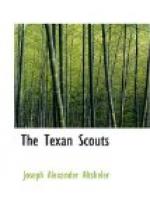IN THE STORM
The horseman rode slowly toward the west, stopping once or twice to examine the wide circle of the horizon with eyes that were trained to note every aspect of the wilderness. On his right the plains melted away in gentle swell after swell, until they met the horizon. Their brown surface was broken only by the spiked and thorny cactus and stray bits of chaparral.
On his left was the wide bed of a river which flowed through the sand, breaking here and there into several streams, and then reuniting, only to scatter its volume a hundred yards further into three or four channels. A bird of prey flew on strong wing over the water, dipped and then rose again, but there was no other sign of life. Beyond, the country southward rolled away, gray and bare, sterile and desolate.
The horseman looked most often into the south. His glances into the north were few and brief, but his eyes dwelled long on the lonely land that lay beyond the yellow current. His was an attractive face. He was young, only a boy, but the brow was broad and high, and the eyes, grave and steady, were those of one who thought much. He was clad completely in buckskin, and his hat was wide of brim. A rifle held in one hand lay across the pommel of his saddle and there were weapons in his belt. Two light, but warm, blankets, folded closely, were tied behind him. The tanned face and the lithe, strong figure showed a wonderful degree of health and strength.
Several hours passed and the horseman rode on steadily though slowly. His main direction was toward the west, and always he kept the river two or three hundred yards on his left. He never failed to search the plains on either side, but chiefly in the south, with the eager, intent gaze that missed nothing. But the lonesome gray land, cut by the coiling yellow river, still rolled before him, and its desolation and chill struck to his heart. It was the depth of the Texan winter, and, at times, icy gusts, born in far mountains, swept across the plains.
The rider presently turned his horse toward the river and stopped on a low bluff overlooking it. His face showed a tinge of disappointment, as if his eyes failed to find objects for which they sought. Again he gazed long and patiently into the south, but without reward.
He resumed his ride parallel with the river, but soon stopped a second time, and held up an open hand, like one who tests the wind. The air was growing perceptibly colder. The strong gusts were now fusing into a steady wind. The day, which had not been bright at any time, was turning darker. The sun was gone and in the far north banks of mists and vapor were gathering. A dreary moaning came over the plain.
Ned Fulton, tried and brave though he was, beheld the omens with alarm. He knew what they portended, and in all that vast wilderness he was alone. Not a human being to share the danger with him! Not a hand to help!




